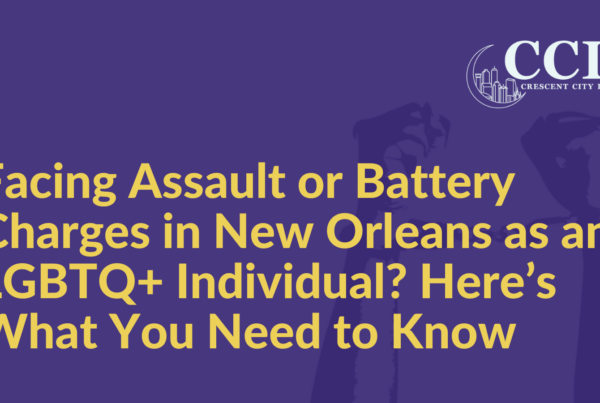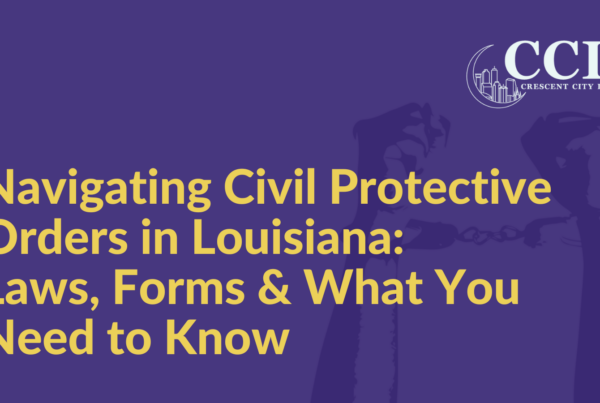Facing criminal charges is overwhelming for anyone, but for non-U.S. citizens, the impact can reach far beyond the courtroom. What might seem like a minor legal issue under Louisiana law could lead to detention, deportation, or permanent separation from your family.
At Crescent City Law, based in the heart of New Orleans, we work with clients navigating the intersection of criminal and immigration law. John Radziewicz, our lead attorney, has dedicated his practice to protecting everyday people, especially those who face uphill battles. If you’re a non-citizen arrested in Louisiana for an offense that might be considered a crime involving moral turpitude (CIMT), here’s what you need to know, and how we can help.
What Exactly Is a Crime Involving Moral Turpitude?
A “crime involving moral turpitude” isn’t a specific statute in Louisiana law. Instead, it’s a federal immigration law term used to describe offenses that are considered inherently immoral, dishonest, or harmful to others. Immigration courts take this classification seriously, often using it to assess someone’s moral character and suitability to remain in the U.S.
Offenses that often fall into the CIMT category include those involving:
- Intentional harm
- Dishonesty or fraud
- A blatant disregard for public safety
Because CIMTs are determined using federal legal standards, not state ones, even a charge that seems minor under Louisiana law can be treated as severe by immigration authorities.
Examples of Crimes Often Considered CIMTs
There’s no exhaustive list of CIMTs, but here are some offenses that often fall under this classification:
Violent Offenses
Property and Fraud-Related Offenses
- Theft or burglary
- Arson
- Credit card fraud or embezzlement
Other Offenses Involving Dishonesty or Risk to Public Welfare
- Perjury
- Forgery
- Bribery
- Animal cruelty
- Failure to register as a sex offender
Even being an accessory to a CIMT or pleading to a lesser charge connected to one can carry serious consequences. Consulting a criminal defense attorney as soon as possible can significantly make a difference to the outcome of your case.
Immigration Consequences Under Federal Law
One of the biggest misconceptions we see is the belief that a small sentence or misdemeanor won’t lead to immigration problems. In reality, even a short sentence, or no jail time at all, can be enough to trigger removal proceedings.
Under 8 U.S.C. § 1227(a)(2)(A)(i), a non-citizen can be deported if convicted of a CIMT within five years of entering the U.S., if the offense carries a possible sentence of one year or more. This applies regardless of whether a full sentence is served.
A CIMT conviction can also make someone inadmissible under 8 U.S.C. § 1182(a)(2)(A)(i), which blocks reentry into the U.S., even with a valid visa, and prevents green card approval or adjustment of status.
- Deportation (removal)
- Visa or green card denial
- Permanent bars to reentry or citizenship
- Loss of eligibility for immigration relief, such as asylum, cancellation of removal, or DACA
Why State Charges Can Be Misleading
Even though most criminal cases in New Orleans are prosecuted under Louisiana state law, immigration courts apply federal definitions and case law to evaluate CIMTs. That means it’s possible to plead guilty to a charge that seems minor locally, only to later discover that it has devastating immigration consequences.
Federal immigration law uses a “categorical approach,” which means authorities evaluate the statutory elements of the crime itself, not the facts or circumstances of your case. If those elements match what immigration courts have previously found to involve moral turpitude, your conviction can be treated as a CIMT.
That’s why it’s so important to consult with an attorney who understands both systems.
Can You Avoid Going to Court?
If you’re worried about attending court in person, whether because of immigration concerns, distance, or fear of enforcement action, we completely understand. At Crescent City Law, we often request to waive our clients’ presence in court when the law allows it.
When the court grants a waiver of appearance, you won’t have to personally attend, and we’ll keep you fully informed every step of the way. It’s one of the many ways we aim to protect your rights, your time, and your peace of mind.
How a Criminal Defense Lawyer in New Orleans Help
If you’re a non-citizen charged with any crime, don’t wait to get legal help. Even if the charge seems “minor,” a conviction or guilty plea could:
- Trigger immediate removal proceedings
- Permanently affect your ability to live or work in the U.S.
- Create a record that’s difficult or impossible to undo later
The decisions made early in your case, especially around plea deals or pretrial diversion, can make all the difference. But they can’t be undone once the court enters a conviction.
At Crescent City Law, we’ve worked with clients throughout New Orleans and across Louisiana, defending their rights in criminal court while safeguarding their immigration future. Whether you’re on a student visa, a green card, or are undocumented, we’re here to advocate for you.
Contact Our New Orleans Criminal Defense Lawyers Today
If you’re a non-citizen facing criminal charges in Louisiana, whether for a crime involving moral turpitude or another offense, the time to act is now. Waiting too long could close doors that might otherwise stay open. Let us help you make informed decisions that protect your life here.
Contact us today at (504) 264-9492 for a no-obligation initial consultation.






